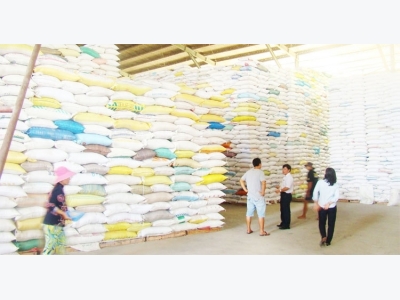Rice exports need a new operating system

The Ministry of Industry and Trade is coordinating with other ministries, sectors and localities to review implementation of Governmental Decree 109/2010/ND-CP (Decree 109) regarding rice exports to prepare for the drafting of a new decree to be submitted to the government for approval.
Unreasonable stipulations on rice storage facilities should be abolished
Strict conditions hinder exports
Decree 109 has undeniably contributed to improving the legal framework for rice exports and enhancing business capability. Under the decree, 140-150 businesses considered sufficiently effective are allowed to export rice.
Statistics show that in early 2016, rice stocks at 143 rice businesses totaled more than 5.34 million tonnes. Decree 109 has promoted linkages between rice trading businesses and farmers, helping reduce post-harvest losses for farmers.
However, conditions in terms of storage facilities, material production areas and sales contracts, which are compulsory for rice exporters under Decree 109, have been a hindrance. Businesses producing and exporting high-quality and organic rice on a small scale are financially incapable or lack land and human resources to invest in storage and processing facilities as required by Decree 109. Due to these limitations, they are not eligible to receive rice export certificates. Examples include the Co May Company Limited in Dong Thap Province and the Vien Phu Trading and Production Joint Stock Company in Ca Mau Province.
Decree 109 also requires each rice export business to have at least one specialized storage facility with minimum capacity of 5,000 tonnes, and one processing facility capable of milling at least 10 tonnes of paddy per hour. Businesses can outsource these services rather than investing their own capital in these costly facilities. Moreover, they have to meet strict requirements in terms of the location of these facilities.
Practical demand
The Vietnamese rice sector is facing numerous challenges, which include not only declines in output and export value in recent years, but also the adverse impacts of climate change, sea level rise, and internal weaknesses of domestic rice value chains.
The unreasonable conditions set for rice exporters should be amended to facilitate rice exports in the new context.
Specifically, conditions pertaining to the size and location of storage and processing facilities should be abolished. Instead, soft criteria should be put in place, such as national technical standards, food safety requirements, and priorities for businesses producing clean rice and applying high technology in production. The export volume should not be restricted.
Businesses just have to report the export volume when implementing export procedures at customs offices. Stipulations on linkages in building material production areas and ensuring the quality of rice for export should be added to the decree.
While raw rice exports bring low added value, many other countries with fewer advantages are promoting rice postproduction industries.
Có thể bạn quan tâm
 Banks’ registered loan for hi-tech agriculture reaches $5.29 billion
Banks’ registered loan for hi-tech agriculture reaches $5.29 billion Eight banks have attended a credit package of VND100 trillion in the hi-tech agriculture field with the total registered capital of (US$5.29 billion).
 Rice prices up in domestic, foreign markets
Rice prices up in domestic, foreign markets The price of Vietnamese rice has increased strongly in both domestic and foreign markets recently because of high demand and limited supply, local reports say.
 Vietnam expects to earn US$3.3 billion from cashew exports
Vietnam expects to earn US$3.3 billion from cashew exports Vietnam’s cashew processing sector aims to export 360,000 tonnes of cashews for US$3.3 billion in 2017, a year-on-year increase of 2.8% in volume